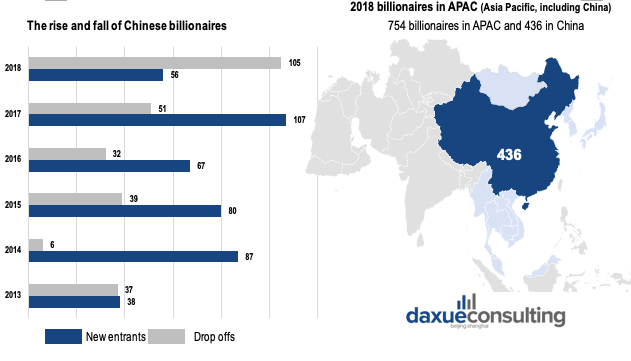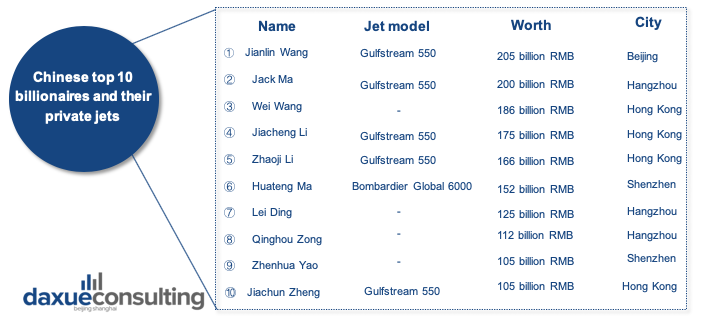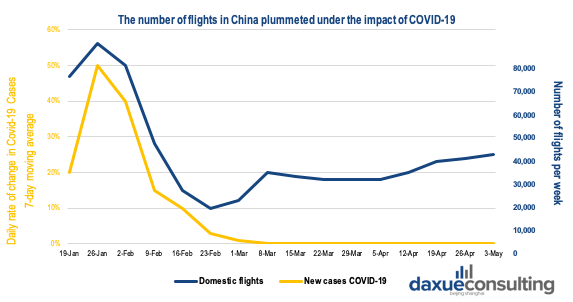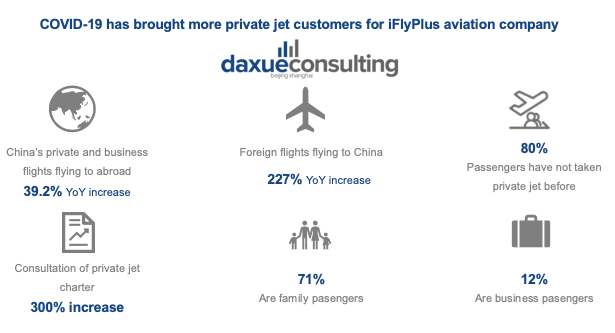An overview of China’s private jet market
Until June 2018, there were 466 business jets in greater China. Then among these aircrafts, there were 163 private jets owned by 113 Chinese billionaires, which increased by 34 private jets from the year before. However, the business jet market size in China could have 1,900 aircrafts on the basis of Chinese enterpreneurs’ purchase power. Hence, the 1,500 aircrafts difference means China’s private jet market is full of opportunities.
Chinese billionaires’ wealth shrunk during the time of the US-China trade war
During the US-China trade war, Chinese wealthy elites tightened their belts, which depressed China’s private jet market.
The Billionaire Report of 2019 shows that after years of steady growth, the net wealth of Chinese billionaires declined by 12.3% in 2018. The number of billionaires in China fell by 48 to 325. The impact of the US-China trade war is a key reason for the decline. 5 years ago, China’s wealthy had more than doubled their net worth.Since then, millionaires in China became more economically conservative.
Prices of business jets are likely to come down, as potential buyers are now finding that they can no longer afford such high expenses. In addition to purchase fees for private jets, owners also need to pay for their maintenance and operation yearly. Generally, the yearly additional expenses for a private jet takes one fifth of its purchasing price, amounting to 33 million RMB for yearly maintenance costs, 20 million RMB for yearly operation costs and a large expense for crew salaries.
The number of billionaires in China

[Source: DW.com – the number of billionaires in China]
China’s top 10 billionaires and their private jets

[source: hurun.index – Chinese top 10 billionaires and their private jets]
Gulfstream is the most popular aircraft producer. Among wealthiest six Chinese entrepreneurs, give chose Gulfstream 550. In China’s private jet market, Gulfstream G550 is Chinese wealthy favorate private jet model. There are 77 gulfstream jets in China, including 39 G550. In addition, there are 36 Bombardier series and most people bought bombardier challenger 605 (12). Other popular private jet producers include Dassault (23), Airbus (10), Embraer (9), Boeing (5) and Cessna (3).
Geographically, Beijing, with its robust economy, has the largest number of business jets, with a total of 34 and it accounts for 21%. Then there are 29 in Yangtze cities including 9 in Shanghai. The third city with most business jets is Hong Kong (25).
What will happen to the private jet market in China post-Covid-19?
Under the impact of COVID-19 in China, domestic and foreign airlines suspended their flights. Under this circumstance, more flexible and safer private jet has become the first or even the only option for many people, creating the busiest quarter in the history of China’s business aviation. Many wealthy Chinese students who were stuck abroad during COVID-19 chose private jets to come back to China and the price of private jet charter rose dramatically. For instance, the price of chartering a private jet with 14 seats rocketed by 30% from 1.35 million RMB to 1.74 million RMB in March. Some student paid an astonishing 180,000 RMB for a ticket home.

[Source: IATA Economics analysis based on WHO data – China’s aviation industry under the impact of COVID-19]
It is a good news for China’s private jet market as the propagation of COVID-19 promoted the demand of private jet and people has become more familiar with it. On April 9th, a new Gulfstream G650 landed in Liaoning, as the first private jet delivered to China after the outbreak of COVID-19. Although the number of certain buyer of private jet in China is not very much, potential customers increases in terms of purchase consultation. Therefore, the vice president of OHFLYER, Haiyang Wang, said that the demand of private jet in China will definitely be higher than before COVID-19.

[Source: CAACNews.com – the demand of private jet increased under the impact of COVID-19]
The private jet charter market and air taxi market are soaring in China
The private jet charter market will promote China’s general aviation development
The charter of private jets is a great choice for Chinese passengers because of its convenience and status symbol. Like luxury watches, social status is an important purchasing impetus for Chinese consumers. We can see a soar in China’s demand for charted private jets as countries become more wealthy and companies adopt more economic travel polices for their trips.
JetSolution, an aviation group based in Hong Kong, is profiting from plane charter service. The company recently bought Embraer Legacy 600 (carrying 13 passengers) to execute flights. The plane features a luxurious interior with large leather chairs and sofa beds and can fly up to seven hours without refueling. Besides, passengers can choose from a selection of fine wines and top-class cuisine.
On another hand, Airports in China are beginning to catch up with the trend. More than 300 airports now accept private jets, with the number expected to increase to about 500 by 2020. This is good news, since the construction and improvement of airports and infrastructures will promote the development of China’s aviation industry.
The “air taxi” will be best mode of transportation in the future
In addition to the charter of private jets, “the air taxi” will be an excellent choice for people to travel in the future in China. The drones market in China has soared in recent years. In 2016, the Ehang 184, invented by China, was unveiled in Las Vegas. The invention of the flying machine marks another breakthrough for robots in the field of urban transportation. The latest drone of Ehang, the Ehang 216, is powered by 16 electric rotors and can fly along a pre-planned route at over 80 mph. The aircraft weighs about 600 pounds and can carry another 500 to 600 pounds of cargo or passengers
Ehang is one of dozens of companies convinced that “flying cars” will become a viable mode of urban transportation in the future. And recently, Ehang received approval from Chinese regulators to launch a commercial air mobility service in Guangzhou. AI in China’s transportation industry is developing dramatically and “the air taxi” could eventually become the best choice for passengers in the near future due to congestion caused by explosive growth of urbanization in China.
Listen to 100 China entrepreneur stories on China Paradigms, the China business podcast
Listen to China Paradigm on Apple Podcast





